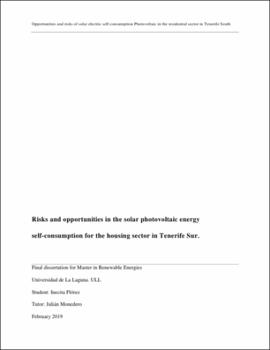Risks and opportunities in the solar photovoltaic energy self-consumption for the housing sector in Tenerife Sur.
Author
Florez Segura, InecitaDate
2019Abstract
The development of a stable market of hundreds and thousands of prosumers of PV solar self-consumption in the residential sector has been an opportunity well taken advantage of in some countries and regions to promote the energetic transition. The present work describes in the first part the current situation of PV solar self-consumption in Europe, Spain and the Canary Islands, summarizing its main characteristics of regulatory support systems for the surplus energy that is injected into the grid. In the second part, a real case of a house that meets the self-consumption profile in the residential sector is studied. The technical and economic viability of the PV solar installation is analysed according to the real calculation of consumption and hourly production. The recent proposal of economic compensation of RD 15/2018, of Self-Consumption of last January 2019 is applied and is pending approval. In the most unfavourable case is calculated the option to continue for 25 years with the current supply of electric company. The next scenario that does not offer advantages of economic profitability is the case of PV solar installation without batteries, with injection to the network. Unfortunately, the economic compensation is not enough, and the net billing proposed by the RD, in this housing profile is not economically viable. The purchase of energy at a price higher than the energy that is injected, without subsidies to the injection or energy compensation make this scenario unfeasible. The last mode with battery storage is more reasonable, with viable profitability results, but unattractive to investors. Due to the above, the proposed measures do not encourage or promote the appearance of hundreds of prosumers in the profile of single-family homes in Tenerife.





